Sue Robb of 4Children talks to Julie Laughton and Alison Britton from the Department for Education about the role of childminders in delivering the 30 hours free entitlement.
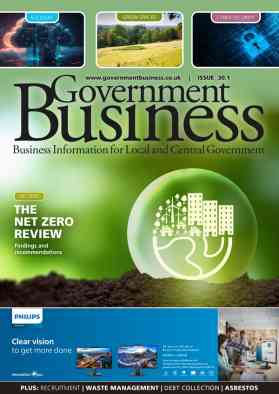
Government Business 30.01
Achieving Net Zero
Rishi Sunak and his government have reached the three-month mark, longer than his predecessor, and the current priority is tackling the cost-of-living crisis.
Meanwhile, many across the public sector are striking over pay and working conditions on a scale that hasn’t been seen for decades.
This issue of Government Business magazine focuses on Net Zero, with a detailed look at Chris Skidmore’s Net Zero review and a call from UK100 to invest in Skills for Local Net Zero. There is also a feature on how to run a Net Zero event.
We’ve included an article on cyber security, jointly authored by representatives from the National Cyber Security Centre and the Department for Levelling Up, Housing and Communities.
Finally, we also cover the latest iteration of the G-Cloud framework, Sir Stephen Timms MP talks about asbestos removal and the managing director of District Enforcement explains how technology can deter fly-tippers.
Polly Jones, editor

G-Cloud Special
Cloud services for the public sector
The latest G-Cloud agreement has been live for just over a month now and will run for a year.
With the introduction of a fourth lot and improved terms and conditions, G-Cloud 13 offers all public sector organisations a simple and compliant way to purchase cloud-based services.
Brought to you by Government Business, Health Business and Education Business magazines, this supplement tells you everything you need to know about G-Cloud 13, including how to search for services, how to assess your search results and how to award a contract.
It also provides helpful links to the G-Cloud webpage and a link to the list of suppliers.
We hope you find this useful.
Polly Jones, editor
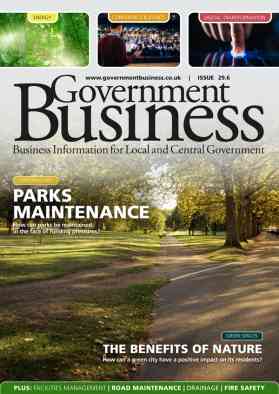
Government Business 29.06
Another day, another government
In our last edition, we were talking about Liz Truss and her new government. However, following a series of dramatic events, she only lasted 45 days in the job.
Now we have the third prime minister of the year. Some of prime minister Rishi Sunak’s appointments have already been criticised. Suella Braverman was reappointed to her role a week after she resigned for a data breach. Gavin Williamson resigned over bullying claims, which Sunak allegedly knew about before his appointment. Now, deputy PM Dominic Raab is facing a formal investigation into his behaviour after two formal complaints were made against him.
One of the first acts of the new government was chancellor Jeremy Hunt’s recent Autumn Statement, which set out tax rises and spending cuts. So far, it has had a better reception than the mini budget of his predecessor Kwasi Kwarteng, which was a catalyst in the downfall of the previous government.
In this issue, we cover different ways to prepare for winter, from facilities management to road maintenance. There are articles on drainage, fire safety and groundscare on what needs to be done in these industries. Finally, the technology section includes digital transformation and the digital skills gap.
Polly Jones, editor
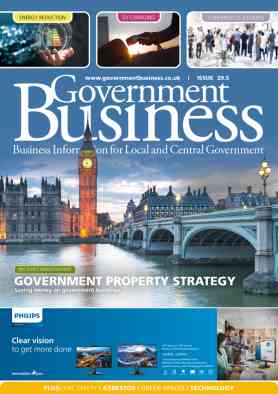
Government Business 29.05
Lots to do for the new government
A lot has changed in government over the last month - a new prime minister, new cabinet and a new monarch following the sad death of Her Majesty The Queen.
Many of the new appointees to government are at least the third to hold the position this year alone. In the last ten years, the UK has seen five different home secretaries, seven individual foreign secretaries and six separate chancellors, with the last three prime ministers all resigning before the end of their term.
There is no denying that this newly formed government has a lot to deal with urgently and over the coming months with the cost-of-living crisis, a still-ongoing NHS backlog and an energy crisis, as well as climate concerns following a record-breaking summer.
This issue looks at some of the areas they will have to tackle, including saving money on the government estate and reducing energy use in the public sector. We also cover fire safety and asbestos removal, along with a look at the return to large conferences and events.
Finally, this issue covers technology, with an analysis of the government’s latest digital strategy, and a look at Google Public Sector in the US, as well as sharing some information on procuring EV charging infrastructure.
Polly Jones, editor

Government Business 29.04
It’s fair to say that things haven’t exactly been plain sailing of late in the rudderless ship of government. After the parliamentary party lanced its boil, regular members now get to choose between current foreign secretary Truss or ex-chancellor Sunak, neither of whom have thus far achieved anything tangible in their bleak ministerial careers. Nothing gets done while they duke it out, and whoever wins will have a mountain to climb to regain trust.
In this issue, we take another look at the Procurement Bill and the potential it has change the way the public sector works.
With staff recruitment and retention always an issue, we dive into the Crown Commercial Service’s Permanent Recruitment Framework.
This issue’s Expert Panel tackles transformational change and asks five big questions around people, process and technology.
The ability of local government to get things done is evident in Smart City Business, which features Edinburgh’s award-winning LED street lighting project and takes a look at Energy Superhub Oxford, reportedly the most powerful EV charging facility in Europe.
Danny Wright, Acting Editor

Government Business 29.03
A level playing field
Among the most technically ambitious of the Government’s planning reforms announced as part of the Levelling Up and Regeneration Bill is the new Infrastructure Levy, which on the face of it appears to be a quicker, fairer way of funding new infrastructure and could even be useful in helping Local Authorities to finally get a grip of affordable housing. The current S106 mechanism - based loosely on floor space - is open to interpretation and often sees projects held up by contractural biccering. New proposals base the levy on the gross development value of the finished project, so both the authority and the developer know where they stand from the get-go.
Also open to interpretation is the language used in the Procurement Bill (see page 29). Rees-Mogg says his post-EU procurement revolution will ’free businesses from straightjackets’ but according to law practice Eversheds Sutherland, the Bills approach to the principles of procurement law appears somewhat unclear. Expect big changes to buying, possibly even by the latter half of 2023.
On the road to net zero, this issue takes a look at Clean Air Zones including Oxford CC’s trailblazing ‘ZEZ’ and a retrofit scheme that can help commercial vehicles operate in the zone. Smart City Business summarises fascinating research into smart city lighting projects and how they can be replicated as well as the innovative use of smart tech in UK ports.
We welcome your feedback.
Danny Wright, acting editor
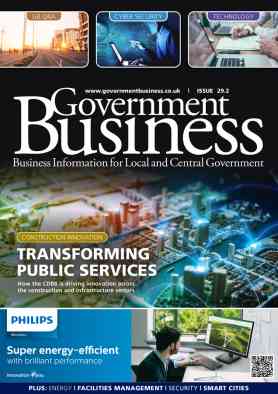
Government Business 29.02
Time to put people at the centre of policy
This March issue of Government Business has a number of varied features which look at the role of placing people at the centre of decision making.
Firstly I would like to signpost you to our interview with Councillor Phélim Mac Cafferty on page 15 in which the leader of Brighton & Hove City Council discusses bringing together people and projects to tackle the climate emergency, as well as local food strategies and reducing transport-related carbon emissions in the city.
On page 19, the IWFM’s Linda Hausmanis discusses why the question of how organisations get the best from their staff has never been more prominent than in today’s world of work. Her thoughts on the triad of people, technology and the workplace is a very interesting read.
Elsewhere, our March energy feature (page 27) analyses the increasing public support for solar and Chris Clarke, from HOPE not hate, writes about the need to focus more on local events which bring people and their communities closer together (page 67). As alway, enjoy the issue.
Michael Lyons, editor
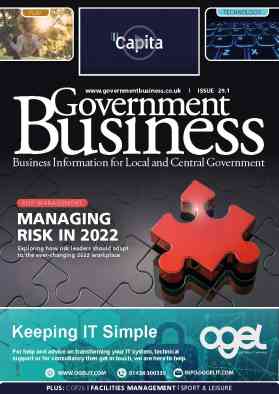
Government Business 29.01
Public health services at risk, say council leaders
The government has announced that England will fully return to Plan A on 27 January thanks to the success of the booster programme.
This means the advise for working from how is removed, face coverings will no longer be required by law in any setting, although public health guidance will remain in place, and venues and events will no longer be required by law to use the NHS Covid Pass.
Unsurprisingly, health leaders have warned against the move, saying that caution is still necessary. The Local Government Association has also used the timing of the announcement to raise the issue of a lack of certainty around councils’ public health funding this year, which, it argues, risks exacerbating the growing crisis of demand for support services that has built up as a result of the pandemic.
Council leaders are calling on the government to urgently publish the Public Health Grant funding allocations which councils will receive from April, as coronavirus pressures intensify due to the Omicron surge.
The LGA said time is also running out with councils having to make critical decisions on renewing contracts for vital public health services, including for health visiting, sexual and reproductive health and suicide prevention, potentially leaving people without crucial help and support.
Michael Lyons, editor
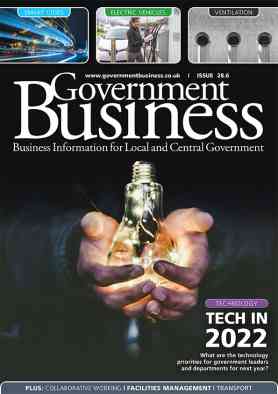
Government Business 28.06
Numbers that make for difficult reading
The past few weeks have produced a number of news stories that present difficult reading for the government.
All local authorities with children’s services across the UK have been informed of the government’s intention to temporarily mandate the National Transfer Scheme, after record numbers of migrants attempted the journey across the English Channel in recent months, culminating in the deaths of 27 people at the end of November.
That is a situation that has solutions available, although time will tell whether existing pressures in local areas make such arrangements as straightforward as hoped.
Meanwhile, the Nuffield Trust has warned that the social care sector in England may have lost up to 50,000 workers across all providers of care in the months leading up to winter. The shortfall is fuelling an invisible care crisis in people’s own homes with many unable to access the care they need, impacting hospital discharges.
The warning followed a survey by the Association of Directors of Adult Social Services which found that almost 400,000 people are now waiting for an assessment of their needs or service, and that one in two councils has had to respond to a care home closure or bankruptcy over the past six months.
As if the winter months were not hard enough already.
Michael Lyons, editor
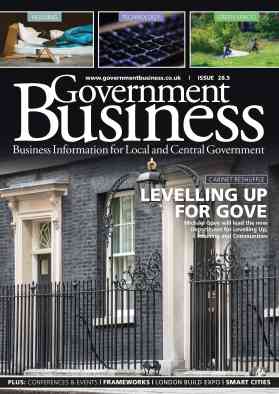
Government Business 28.05
A name change for local government department
Following a cabinet reshuffle last month, the MHCLG was rebranded as the Department for Levelling Up, Housing and Communities, with Michael Gove at the helm.
Despite many Conservative MPs remaining unsure as to what levelling up means or looks like, the Prime Minister said that his new Secretary of State for Levelling Up will drive cross-Whitehall efforts to deliver a programme of tangible improvements in every part of the UK as we build back better from the pandemic, and deliver on the people’s priorities.
Neither Boris Johnson or Gove outlined what they felt the people’s priorities were, but the latter did describe the levelling up agenda as ‘the defining mission of this government’. On the steps of Downing Street at the end of 2019, new Prime Minister vowed to ‘fix the crisis in social care once and for all’, which goes to show that defining missions can, of course, be misleading.
A second headquarters in the city of Wolverhampton, recently unveiled, is a good starting point for shifting priorities and pledges away from Westminster and into new communities, but, as the Local Government Association said in its response to Gove’s appointment, the coronavirus crisis has emphatically shown what can be achieved when the government empowers councils to innovate and create new services locally. So, more of the same please, Mr Gove?
Michael Lyons, editor
Pages
Company Focus
Just Lanyards is a subsidiary name of Gifts 2 Impress Limited, who have been trading for over 25 years, we therefore pride ourselves in having endless experience covering all aspects of the promotional merchandise industry.
Event Diary
UKREiiF has quickly become a must-attend in the industry calendar for Government departments and local authorities.
The multi-award-winning UK Construction Week (UKCW), is the UK’s biggest trade event for the built environment that connects the whole supply chain to be the catalyst for growth and positive change in the industry.
Supplier Profiles
Geo Energy
At GeoEnergy Design, we're on a mission to disrupt the traditional way heating and cooling ha
Latest Features
Professor Harith Alani, director of the Knowledge Management Institute at the Open University explains how AI can be used for good and bad.
Alex Lawrence, head of health & social care, techUK sets out techUK’s Five Point Plan for CareTech.












